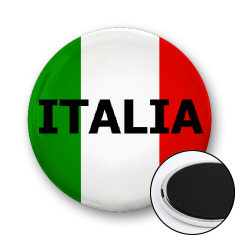 |
Your guide to Italy & Italian Culture on the Web. Enjoy as you learn more about the traditions, heritage and way of life that make Italians who they are. |
| Home | Advertise | Articles | Forum | Store |
Art, Cuisine, Famous Italians, Festivals, Folklore, Genealogy, Holidays, Maps, Photos, Sports, Travel and More
Surname Collection
Add your name to the collection.
Recipes
Authentic Italian recipes for you to enjoy.
Photo Galleries
Enjoy photos of Italy, wine making & more.
Proverbi
Proverbs in Italian & English.
Our Paesani
Weekly column dedicated to today's Italy.
Italian Memories
Articles on growing up Italian.
Learn Italian
English-Italian guides
Spanish-Italian guides.
| Gift Guide |
Books | Calendars Clothing | Music Posters/Prints Videos |
Regional Guides
Guides to Italy's regions.
Molto Italiano
Sign up for our FREE newsletter.
Trivia
Test your knowledge of Italy.
June 13, 1906 - July 20, 1985
An Italian probabilist and statistician, noted for the "operational subjective" conception of probability. The classic exposition of his distinctive theory is the 1937 "La prévision: ses lois logiques, ses sources subjectives," Annales de l'Institute Henri Poincaré, 7, 1-68, which discussed probability founded on the coherence of betting odds and the consequences of exchangeability.
De Finetti proposed a thought experiment along the following lines (described in great detail at coherence (philosophical gambling strategy)): You must set the price of a promise to pay $1 if there was life on Mars 1 billion years ago, and $0 if there was not, and tomorrow the answer will be revealed. You know that your opponent will be able to choose either to buy such a promise from you at the price you have set, or require you to buy such a promise from your opponent, still at the same price. In other words: you set the odds, but your opponent decides which side of the bet will be yours. The price you set is the "operational subjective probability" that you assign to the proposition on which you are betting. This price has to obey the probability axioms if you are not to face certain loss, as you would if you set a price above $1 (or a negative price). By considering bets on more than one event de Finetti could justify additivity. Prices, or equivalently odds, that do not expose you to certain loss are called coherent.
De Finetti is also noted for de Finetti's theorem on exchangeable sequences of random variables. De Finetti was not the first to study exchangeability but he put the subject on the map. He started publishing on exchangeability in the late 1920s but the 1937 article is his most famous treatment.
De Finetti studied mathematics at Milan University. After graduation, he did not pursue an academic career but worked as an actuary and a statistician. He published extensively (17 papers in 1930 alone, according to Lindley) and acquired an international reputation in the small world of probability mathematicians. He won a chair in Financial Mathematics at Trieste University (1939). In 1954 he moved to the University of Rome, first to another chair in Financial Mathematics and then, from 1961 to 1976, one in the Calculus of Probabilities. De Finetti developed his ideas on subjective probability in the 1920s independently of Frank P. Ramsey. He only became known in the Anglo-American statistical world in the 1950s when L. J. Savage, who had independently adopted subjectivism, drew him into it.
From Wikipedia, the free encyclopedia.
This article is licensed under the GNU Free Documentation License, which means that you can copy and modify it as long as the entire work (including additions) remains under this license. For more information, visit http://www.gnu.org/copyleft/fdl.html.
Site Sponsors
Shops/Stores
Italiansrus
Wear RomeGiftShop
Italian Charms Gioie.it Gustobene.com Made
In Firenze Car Hire
Italy Tour Italy
Vegetarian Cooking Tours
HotelsItaly.com
Proudly display the colors of Italy with these great
products.
Purchase souvenirs & gifts from Rome & Italy. Get FREE
postcards from Rome.
![]()
Express your individuality by creating your own
bracelet.
![]()
Italian Jewels Online.
Use
code Italiansruspromo to receive a
10% discount off your entire purchase.
![]()
Featuring arts & crafts made in Florence.
Travel
Car hire in Italy from IIB Autos.
Customize your trip to Italy.
The vegetarian experience of a lifetime.
Book your hotel in Italy now!

